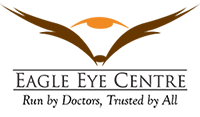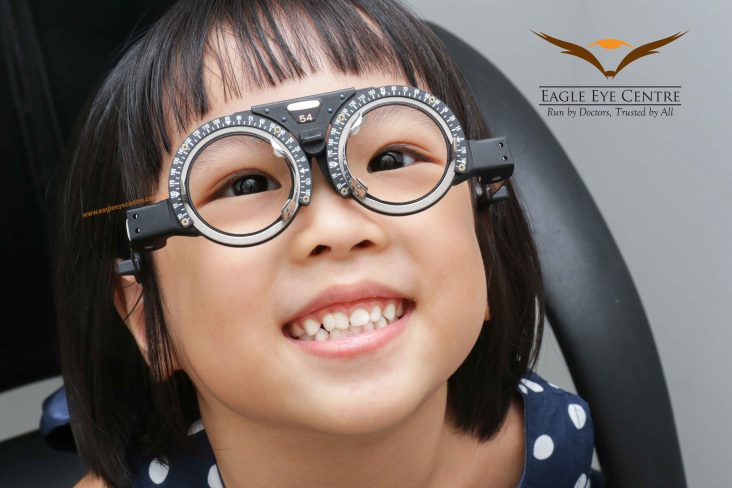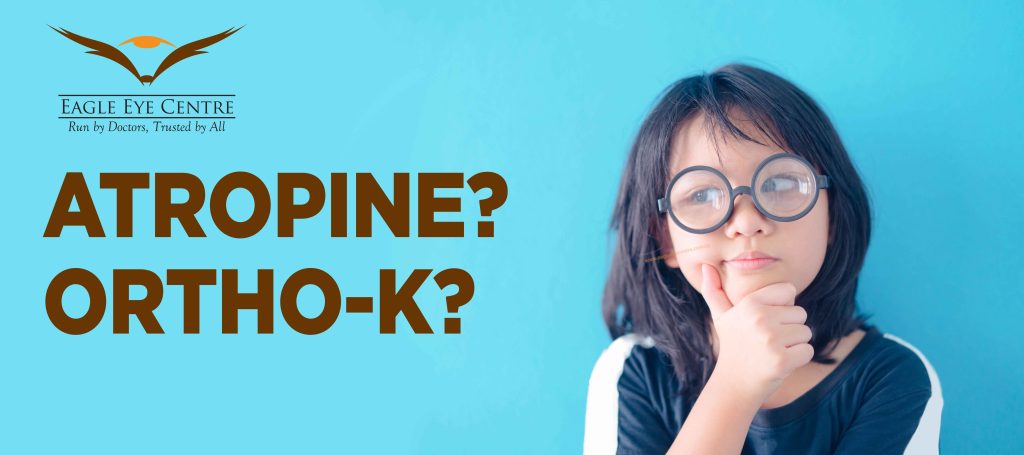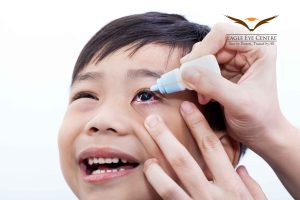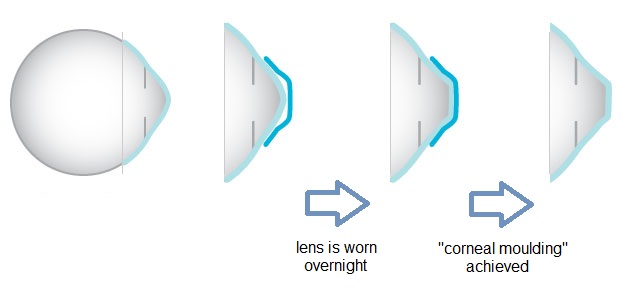Myopia ( nearsightedness ) is becoming more prevalent in children around the world. Asia has been the epicentre of this myopia epidemic and the situation seems to have worsened during this Covid-19 pandemic when many school children are engaging in more online educational activities.
As a parent, you might be wondering if there’s a cure for myopia or at least prevent it from deteriorating – A similar question for Ophthalmologists and researchers alike. Don’t fret, there’s hope. Many studies have shown a few methods that can be applied in order to slow the progression of your child’s myopia.
Myopia control
Why should we be interested in controlling the progression of myopia? Because myopia, if severe, can be associated with other eye problems such as amblyopia, cataracts, glaucoma, macular degeneration and retinal detachment.
Unfortunately, once myopia has developed, it will not be possible to reverse the condition without surgical interventions. It is therefore imperative to detect myopia early and prevent it from increasing further.
Currently, there are 2 main modalities of treatment that have been scientifically proven to achieve good results in curbing the progression of myopia in children:
Atropine eye drops for myopia
The use of atropine eye drops has been around since the late 1800s. Historically, the use of atropine extracts were a form of beautification, where the Rennaissance women applied atropine extracts to enlarge their pupils in hopes to become more alluring. Nowadays, It’s most commonly used for uveitis (eye inflammation) treatment, amblyopia (lazy eye) penalisation therapy and myopia control.
What can atropine do? Studies have shown that atropine has the capability to prevent the excess
ive elongation of the eyeball which results in myopia progression. In fact, atropine eye drops of various concentrations have been found to be effective in controlling the progression of myopia in many studies around the World.
Based on a study by the Singapore Eye Research Institute, using Atropine 1% showed a highly promising result with an 77% reduction in myopia progression over a 2-year span, proving that myopia progression can be retarded pharmacologically.
Importantly, safety data from the study confirmed that atropine eye drops is well tolerated and free from significant complications. More recently, a follow-up study showed that lower concentrations of atropine eye drops were also effective in slowing down myopia progression. It showed that side effects were minimal and children did not need transitional or progressive glasses which was necessary in children on Atropine 1% therapy. In particular Atropine 0.01% reduced myopia progression by almost 60% and showed less rebound after stopping the drops when compared to the higher concentrations.
**Reference: Atropine for the Treatment of Childhood Myopia Vol.113, Ophthalmology 2006;113:2285-2291 – 2006 by the American Academy of Ophthalmology
Parents must also take note that adequate monitoring is required to assess the efficacy as well as potential side effects (especially for the higher concentrations of Atropine). Ophthalmologists in Eagle Eye Centre provides a structured programme (Eagle Myopia Control Programme) in order to monitor the progression of the child’s myopia degree.
In Eagle Eye Centre, we have atropine eye drops of various concentrations – 0.01%, 0.025%, 0.05%, 0.125%, 0.5% and 1% and we will customise the therapy according to the needs of our young patients.
Orthokeratology (Ortho-K) lenses
Orthokeratology (ortho-k) involves the use of rigid, gas-permeable contact lenses worn overnight to shape the cornea in order to correct mild to moderate refractive errors. Patients do not need to wear the lenses during the day, but the effect is temporary and they need to be worn regularly at night to maintain clear daytime vision.
Studies in 2004 and 2005
In 2004, the Children’s Overnight Orthokeratology Investigation (COOKI) pilot study published the first report on orthokeratology lenses for myopia control. Subsequently in 2005, the Longitudinal Orthokeratology Research in Children (LORIC) study was also released. Both studies showed that orthokeratology lenses were effective at controlling childhood myopia.
Stabilizing Myopia by Accelerated Reshaping Technique (SMART)
A five year study initiated in 2009, evaluated the effect of orthokeratology lenses on myopia progression in 138 children. At the one year follow up, the children who were fitted with orthokeratology lenses exhibited a mean progression of 0 degree, compared to the control group that had an average increase of 50 degrees for myopia.
Corneal Reshaping and Yearly Observation of Myopia (CRAYON)
A two year study that confirmed children fitted with orthokeratology lenses experienced significantly less annual changes in axial length and vitreous chamber depth than patients fitted with soft contact lenses.
Based on these clinical studies, Eagle Eye Centre has designed the Eagle Myopia Control Program Using Myopia Corrective Contact Lens (EMCP LENS) for children 7 to 12 years of age.
This program consists of 12 visits in total; 9 visits to see the optometrist and 3 visits to see the doctor to monitor eye health. The child wears the myopia corrective contact lenses overnight, for at least 8 hours, in order to achieve the optimal effect of corneal moulding.
The lens is to be removed upon waking in the morning and the effect of corneal moulding will temporarily allow the child to see without the use of optical appliances during the day. The exact time period over which the myopia remains corrected varies with each child and this effect can only be maintained by wearing the myopia corrective contact lenses every night.
The common side effects that occur in contact lens wear are decreased oxygen to the cornea, corneal staining and corneal abrasion. These are usually temporary if the lenses are removed promptly and professional care is exercised. They can also be prevented with proper lens maintenance and care. In rare instances, permanent corneal scarring and decrease in vision may occur. Therefore, it is mandatory to return for reviews that will be scheduled regularly in the program with our optometrist and ophthalmologist.
Early detection
It is important to schedule routine eye exams for your child, especially right before they enter preschool, even if they’re not complaining about vision problems.
Take note that Myopia is genetically transmitted. The chances for the child to have myopia are extremely high If both parents are myopic.
Can adults control myopia too?
It’s less common for adults to experience a developing and progressive stage of myopia. It usually develops during the early school years, which is why most of the programmes and studies developed are for children.
However, there are other methods that can be used to treat nearsightedness in adults. These methods involve reshaping the cornea which is what laser refractive procedure does, or surgical implants such as the implantable collamer lens.
Learn more about LASIK and ICL!
Are eye exercises helpful?
Recently, there have been an influx of advertisements which claims to correct the eyesight, cure myopia, “naturally”. Unfortunately, there are no well-designed studies that provide scientific evidence that these exercises can help and are highly suspect, in fact, there’s a higher probability and risk of damaging the eye. Patients beware!
What can we do for you?
Visit this link, email us at email@eagleeyecentre.com.sg or call us at 6456 1000 to find out more about Eagle Myopia Control Program.
